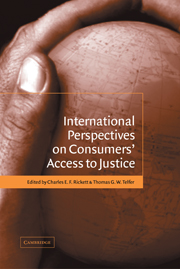Book contents
- Frontmatter
- Contents
- List of contributors
- Preface
- Table of cases
- Table of statutes
- 1 Consumers' access to justice: an introduction
- Part I Perspectives on consumers' access to justice
- Part II Issues in contract and tort
- Part III Services and the consumer
- Part IV Consumer bankruptcy law
- Part V Procedure and process issues
- 12 Privatisation and power: dispute resolution for the Internet
- 13 Armageddon through aggregation? The use and abuse of class actions in international dispute resolution
- Part VI Conflict of laws issues
- Index
13 - Armageddon through aggregation? The use and abuse of class actions in international dispute resolution
from Part V - Procedure and process issues
Published online by Cambridge University Press: 11 July 2009
- Frontmatter
- Contents
- List of contributors
- Preface
- Table of cases
- Table of statutes
- 1 Consumers' access to justice: an introduction
- Part I Perspectives on consumers' access to justice
- Part II Issues in contract and tort
- Part III Services and the consumer
- Part IV Consumer bankruptcy law
- Part V Procedure and process issues
- 12 Privatisation and power: dispute resolution for the Internet
- 13 Armageddon through aggregation? The use and abuse of class actions in international dispute resolution
- Part VI Conflict of laws issues
- Index
Summary
Introduction
A troubling and dangerous phenomenon has emerged onto the international litigation landscape. The system of justice understood and appreciated by citizens in most democratic states, one that guarantees individual plaintiffs and defendants their ‘day in court’, is increasingly being sidestepped by procedural rules that allow entrepreneurial lawyers to aggregate claims into massive controversies that, for all practical purposes, cannot be tried. Although these massive cases arise in varying formats, they share a single intimidating characteristic: the designed imposition of enormous and intolerable risks which defendants cannot prudently accept by insisting on their ‘day in court’ in a jury trial.
Although some courts have refused to accept this type of ‘judicial blackmail’, the practice has not been disapproved uniformly. Indeed, the mere threat of international class actions, especially those regarding human rights violations occurring in other countries, has produced gigantic settlements in the United States. The recently concluded slave labour and Holocaust victims' class actions against German companies and the Swiss banks are illustrative. In those controversies, sovereign states and major international institutions paid billions of US dollars to resolve claims by many persons residing outside the United States arising from activities occurring wholly outside the United States. Moreover, the settlements occurred not only in the absence of any adverse rulings on the merits of the case, but also, at least in so far as the Germans were concerned, despite favourable rulings holding that the matters were not justiciable in United States courts.
- Type
- Chapter
- Information
- International Perspectives on Consumers' Access to Justice , pp. 330 - 356Publisher: Cambridge University PressPrint publication year: 2003
- 1
- Cited by



